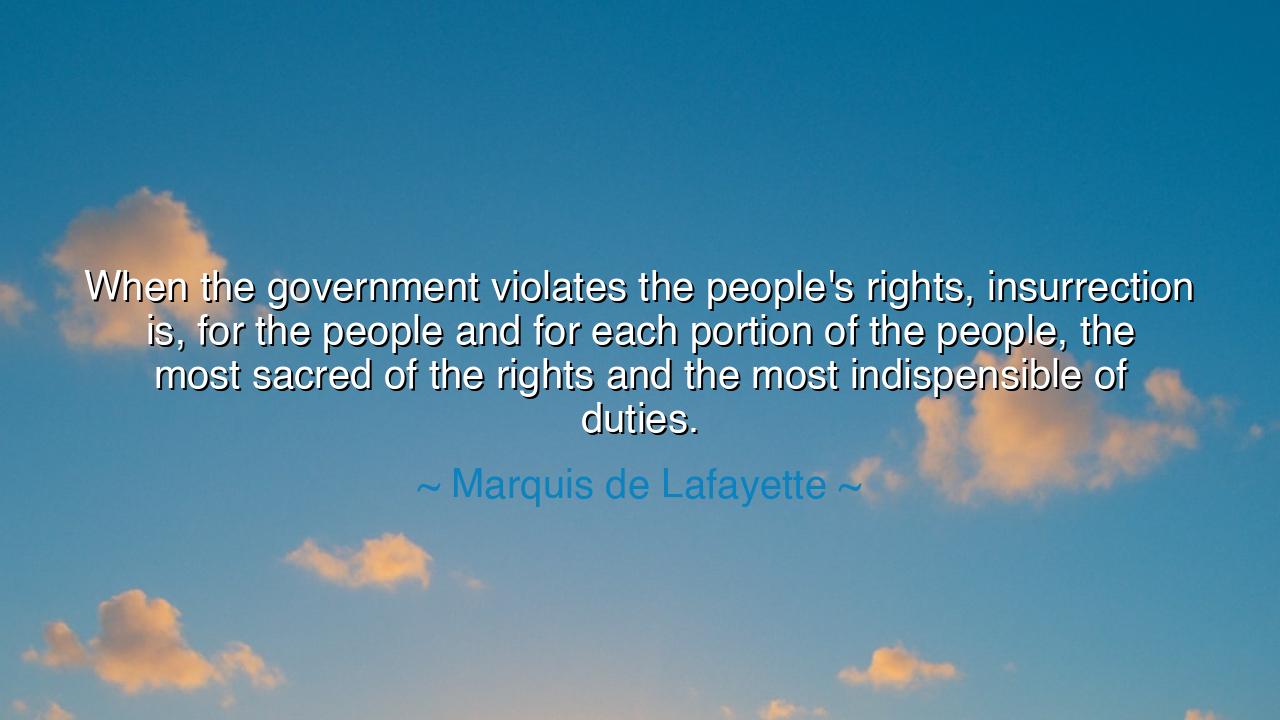
When the government violates the people's rights, insurrection
When the government violates the people's rights, insurrection is, for the people and for each portion of the people, the most sacred of the rights and the most indispensible of duties.






"When the government violates the people's rights, insurrection is, for the people and for each portion of the people, the most sacred of the rights and the most indispensable of duties." — Marquis de Lafayette
Hear these words, O children of liberty, and feel the fire that burns within them. The Marquis de Lafayette, a warrior of two revolutions — one in America, the other in France — spoke them as both a warning and a promise. When he declared, “When the government violates the people’s rights, insurrection is... the most sacred of the rights and the most indispensable of duties,” he was not calling for reckless rebellion, but for the defense of human dignity. He spoke as one who had stood beside George Washington on the fields of freedom, and who had seen with his own eyes that tyranny does not fall by words alone, but by the courage of those who refuse to bow. His words are a cry from the heart of a man who believed that liberty is not a gift from rulers, but a birthright of the governed.
The meaning of this quote is both terrible and noble. Lafayette reminds us that there exists a point beyond which obedience becomes betrayal — betrayal of truth, of justice, of one’s own soul. When rulers forget that power is a trust, and not a throne; when they silence the people, steal their rights, and corrupt the laws meant to protect them, then the people’s duty is not submission, but resistance. Such resistance, he says, is not merely permitted — it is sacred, for it springs from the same divine spark that gives man his freedom. To rise against tyranny is to honor creation itself; to kneel before it is to deny the very purpose of being human.
The origin of these words lies in the crucible of revolution. Lafayette was born into nobility, yet he rejected privilege for principle. As a young man, he crossed the ocean to fight beside Washington and the patriots of America, risking his life for a freedom not his own. Later, in France, he stood before the flames of his own nation’s awakening. But he watched in anguish as the Revolution, once pure, devoured itself in terror and blood. Through these trials, Lafayette came to understand that liberty must walk a narrow path — that rebellion without justice becomes chaos, yet obedience without conscience becomes slavery. His words were forged in that balance: insurrection is sacred only when justice demands it.
Consider the story of the American Revolution, where farmers and blacksmiths, tradesmen and scholars stood against the might of an empire. To the crown, they were traitors; to history, they became heroes. For their government had ceased to govern with their consent — it taxed without representation, punished without trial, and sought to rule without right. When they raised the banner of rebellion, they were not grasping for power; they were reclaiming what had been stolen — their inalienable rights. Their uprising was not born of hatred, but of love — love of freedom, of family, of the dignity of man. Lafayette himself fought alongside them, carrying these ideals back across the sea, believing they belonged not to one people, but to all mankind.
Yet Lafayette’s words also carry a shadow of warning. He saw in France how the same fire that frees can also consume. When the Revolution fell into the hands of vengeance and bloodlust, liberty was drowned in terror. Thus, he teaches us that insurrection, though sacred, must remain just. To rise without moral purpose is to destroy what one seeks to save. The sword drawn for freedom must never become the sword of oppression. True rebellion is not an act of rage, but an act of faith — faith in reason, in justice, and in the eternal law that no man may rightfully rule another without his consent.
The heart of Lafayette’s message is not violence, but responsibility. Every generation, he says, must guard its liberty as a priest guards a sacred flame. Do not wait for tyranny to grow fat and old before you resist it; do not trust in the promise that “it cannot happen here.” For oppression always enters quietly — through fear, through comfort, through the slow erosion of rights. And when it comes, the duty to resist lies not in others, but in each of us. The “most indispensable of duties,” he calls it — a call not just to battle, but to vigilance, to courage, and to conscience.
So let this be your lesson, O inheritors of freedom: liberty lives only where men and women are willing to defend it. When government serves the people, honor it. When it betrays them, question it. And when it commands you to act against justice, defy it. But do so with wisdom, not wrath; with courage, not cruelty. For rebellion guided by virtue is the hammer of renewal, but rebellion driven by hatred is the flame that consumes all. Lafayette’s words echo through the centuries to remind us: freedom is not a gift, nor a guarantee — it is a trust, written upon the hearts of the brave. And when that trust is broken, to rise in its defense is not merely one’s right — it is one’s sacred duty.






AAdministratorAdministrator
Welcome, honored guests. Please leave a comment, we will respond soon